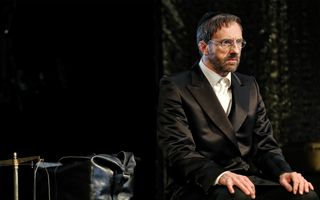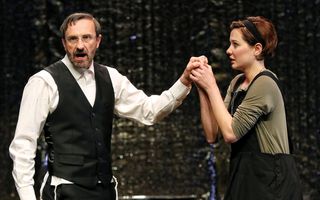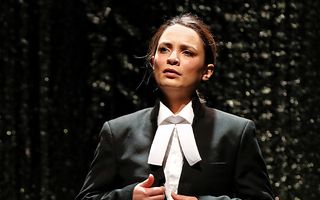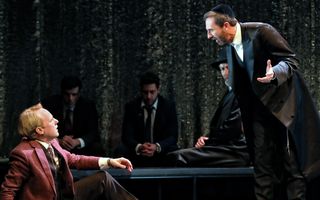 Watch
Watch
ACT 1
In sooth, I know not why I am so sad...
Antonio, Act 1, Scene 1
The wealthy young gentlemen of Venice are in good spirits, all except Antonio, a merchant. His friends try to cheer him up, or at least get to the bottom of what might be making him so sad. They wonder if Antonio’s grief is because he has risked his fortune on merchandise still at sea, or because he may be in love. He assures them it is neither, so the source of his sadness remains a mystery.
Antonio’s most treasured friend, Bassanio, needs to borrow some money. He plans to woo Portia, a wealthy heiress, but to do so he needs some capital. He concedes that he has been very irresponsible with money in the past, and already owes a great debt to Antonio, but promises that this time will be different and he will pay back everything he owes. Antonio is quick to assure his friend that Bassanio need only ask and he will be supplied with whatever he needs. However, most of Antonio’s cash is currently invested and he doesn’t have access to his money at present. Bassanio and Antonio decide to approach Shylock, a Jewish money lender, for a loan.
As a Jew, Shylock is regularly the target of religious discrimination, hatred, and abuse at the hands of Antonio and other Christians in Venice. He is furious at his treatment and at the fact that Antonio lends money to people without charging interest, thereby robbing Shylock of his only option for making a living. However, in a strictly business sense, he concludes that Antonio is a reasonable risk and so agrees to lend him 3,000 ducats for a period of 3 months. In the spirit of “friendship” (Act 1, Scene 3) Shylock offers to not charge interest and to set the penalty for defaulting on the loan at a pound of Antonio’s flesh. Bassanio is wary of these terms, but Antonio is confident that all his investments will have paid off by the time the money needs to be repaid, so he agrees to the deal.
In Belmont, the young heiress Portia complains to her lady-in-waiting, Nerissa, that she has everything she could possibly want except the ability to make her own choice about who she must marry. Portia’s late father has set up a kind of test whereby any potential suitor must choose between three caskets to obtain her hand in marriage: gold, silver, or lead. If the suitor chooses correctly they will win Portia’s hand, but if they choose incorrectly they must vow never to marry. Portia and Nerissa make fun of the various wealthy, well-bred men who have decided not to even attempt the game, for fear of making the wrong choice. Nerissa recalls a visitor they met some time ago called Bassanio, and Portia remembers him fondly. More suitors arrive, and the next hopeful is the Prince of Morocco, much to Portia’s dismay.
ACT 2
All that glisters is not gold.
Morocco, Act 2, Scene 7
In Venice there is unrest in Shylock’s house. His servant Launcelot Gobbo has decided, despite much debate with his own conscience, to leave Shylock and seek employment with Bassanio. On the street Launcelot encounters his father, Old Gobbo, who has come to Venice to find his son. The old man is blind and asks Launcelot for directions but rather than embrace his father, Launcelot decides to play a trick on him and tells him that his son is dead. Old Gobbo is understandably upset, but almost immediately, Launcelot clears up the confusion and reassures his father that he is in fact alive. The two of them find Bassanio who agrees to take on Launcelot as a servant. Launcelot will need to leave with Bassanio for Belmont that night.
Shylock’s daughter, Jessica, is very sad to see Launcelot go, but she is also determined to cut ties with her father. She sends a letter with Launcelot to one of Bassanio’s friends, Lorenzo. She wants Lorenzo to take her away from Shylock’s house so they can be married and she can convert to Christianity. Upon reading the letter, Lorenzo formulates a plan and enlists his friends to help Jessica escape from her home that night.
Launcelot returns to Shylock’s house to deliver both his resignation and instructions to Jessica for her escape. Shylock is on his way out to supper with Bassanio. He is reluctant to go, and gives Jessica strict instructions to stay indoors and lock the house up, because of a Christian festival that is happening in the street. Later that night while Shylock is out, Lorenzo arrives with his friends, Gratiano and Salarino, to facilitate Jessica’s escape. Not only does Jessica run away with Lorenzo, but she takes with her as much money and jewels as the pair of them can carry. At the last moment, Antonio enters and tells Gratiano that this evening’s festivities are cancelled and Gratiano must join Bassanio to leave for Belmont immediately.
When Shylock learns of his daughter’s escape he is furious. Salarino and Salanio relate to each other how they have seen Shylock railing in the streets about Jessica not only eloping with a Christian, but also the quantity of money that she took with her. They mock Shylock but they also express their concern for Antonio. Salarino says he has heard reports of ships full of rich cargo being wrecked in the English Channel. He is worried that in this mood, Shylock will be merciless if Antonio cannot repay the money he borrowed.
Meanwhile in Belmont, the Prince of Morocco has made his choice. He chooses the gold casket and, much to Portia’s relief, he is incorrect. Next to chance his fate is the Prince of Arragon. He selects the silver casket and he too leaves disappointed. Portia and Nerissa receive word that a young Venetian has arrived in Belmont and is coming to try his luck at the casket game. There is much anticipation as they go to greet him, and Nerissa hopes it might in fact be Bassanio.
ACT 3
If you prick us do we not bleed? If you tickle us do we not laugh? If you poison us do we not die? And if you wrong us shall we not revenge?
Shylock, Act 3, Scene 1
Salarino and Salanio have heard more talk around Venice of Antonio’s ships being wrecked at sea. Shylock is overjoyed at the prospect of claiming his pound of flesh and thus getting his revenge for the way Antonio has treated him. Tubal, a friend of Shylock’s, arrives and stirs him into a frenzy with stories of both Antonio’s impending bankruptcy and Jessica’s frivolous spending of Shylock’s money.
Much to Portia and Nerissa’s delight, Bassanio and Gratiano have arrived in Belmont. Portia asks Bassanio to delay his choosing of a casket for fear he will choose incorrectly, but Bassanio is determined. Portia sings a song with lots of words that rhyme with ‘lead’ to perhaps give Bassanio a clue in his decision. In the end he chooses the correct casket of lead, and Portia is happy and relieved that Bassanio is the person she must marry. By a stroke of good fortune Gratiano and Nerissa also fancy each other and they too decide to marry.
Portia gives Bassanio a ring that she says symbolises everything that was once hers, and that now belongs to him. However, she is very clear that if he loses or gives away the ring it will mean the end of their love. Nerissa gives a similar ring to Gratiano with the same condition. All seems well until Salerio, Lorenzo and Jessica arrive with news that Antonio’s ships have been lost at sea, so he will not be able to repay his debt. Shylock is demanding the agreed penalty; a pound of Antonio’s flesh. Portia offers to pay 20 times the loan to save the friend of her new fiancé and urges Bassanio to rush to Venice, but Jessica says that her father is far more interested in revenge and no amount of money will satisfy him.
Bassanio, Gratiano, and Salerio leave for Venice. Portia announces that she and Nerissa will live in a local monastery until their husbands’ return, leaving Lorenza and Jessica to take care of her estate. But Portia has concocted a plan and tells Nerissa that that the two of them are going to Venice in disguise.
In Venice, Antonio seems to be embracing his fate. He understands that Venice is built on its reputation of upholding the law, and while his friends beg Shylock for mercy, Antonio’s main concern is that Bassanio returns in time to see Antonio make the ultimate sacrifice to pay his debt. Shylock is convinced the Duke will have no choice but to find in his favour so he ignores all pleas for mercy and has Antonio taken away to face the court.
ACT 4
The quality of mercy is not strain’d;
It droppeth as the gentle rain from heaven
Upon the place beneath...
Portia, Act 4, Scene 1
In court no amount of pleading, or compromise, nor even offers of money can sway Shylock from his insistence on taking a pound of Antonio’s flesh. Bassanio offers to pay twice the original loan and Shylock says that even six times that offer would not change his mind. The Duke admits that his hands are tied by the law of Venice, but he says that no one truly believes that Shylock would be inhuman enough to actually enact the penalty. Shylock insists that it is his right, according to the laws of Venice, and should those laws be ignored in this case, then many of the structures around which Venetians have built their society will come crashing down.
News arrives of a brilliant young lawyer, Balthasar, who has been sent to advise on the case. This is Portia in disguise, with Nerissa disguised as her clerk, but neither of them are recognised, not even by their husbands. Balthasar is welcomed into the courtroom to pass judgement. Portia makes a clever show of impartiality and agrees that it is difficult to argue against Shylock’s right to the pound of flesh, but in one of the most famous speeches in all of Shakespeare’s work (“The quality of mercy is not strained”, Act 4, Scene 1), she adds her voice to the many insisting that Shylock show mercy. Shylock is defiant and points out that there is no legal compulsion forcing him to be merciful. Even when he is warned that he risks not being shown mercy in return, Shylock asserts that he has no fear of that because he has done nothing wrong. So Portia, as Balthasar, has no option but to find in favour of Shylock.
Shylock is ecstatic and prepares to cut Antonio. But at the last moment, Portia reminds Shylock that while his contract entitles him to a ‘pound of flesh’, it makes no mention of taking any blood. In fact, if Shylock drops any blood whatsoever in the taking of the flesh, he will stand accused of conspiring against the life of a Venetian citizen and his entire estate will be confiscated by the state. Shylock knows he cannot take any of Antonio’s flesh without spilling some blood, so he drops his argument and asks to simply have the debt repaid. But Portia tells him it is too late for that and, because as a Jew he is not considered a citizen of Venice, he is now subject to a particularly harsh penalty for threatening the life of a citizen.Half of all Shylock’s land and goods will go to the state and the other half to Antonio. The Duke shows some mercy on Shylock when he demands just a fine rather than half of Shylock’s wealth. Antonio declines to take his share on the condition that Shylock convert to Christianity, and upon his death, bequeath his entire estate to Jessica and Lorenzo. Shylock is crushed.
Still not recognising his wife, Bassanio wants to express his gratitude to the brilliant young Balthasar for saving his friend’s life. He offers the money that he has brought with him to pay off Shylock but Portia (as Balthasar) declines. On Bassanio’s insistence that there be some token of payment, Portia eventually asks for Antonio’s gloves and Bassanio’s ring. When Bassanio explains why he couldn’t possibly part with the ring, Antonio insists that what this young lawyer has done is worth more than Bassanio’s promise to his wife. So Bassanio gives the ring to Balthasar, Gratiano gives his to the young clerk (a disguised Nerissa) and Portia and Nerissa return to Belmont.
ACT 5
Sweet lady, you have given me life and living;
For here I read for certain that my ships
Are safely come to road.
Antonio, Act 5, Scene 1
Bassanio and Gratiano bring Antonio to Belmont with them where they are greeted by their wives. Portia and Nerissa cannot believe their new husbands have so quickly parted with the rings they were given and insist that it is evidence of infidelity. The men plead with their wives that they had to give them up under dire circumstances. The men are stunned when the women produce the very same rings, and reveal that the lawyer and his clerk were in fact Portia and Nerissa in disguise. Adding to the joyous occasion is the news that Antonio’s ships have made a miraculous recovery, and Lorenzo and Jessica are set to inherit a fortune from Shylock.





